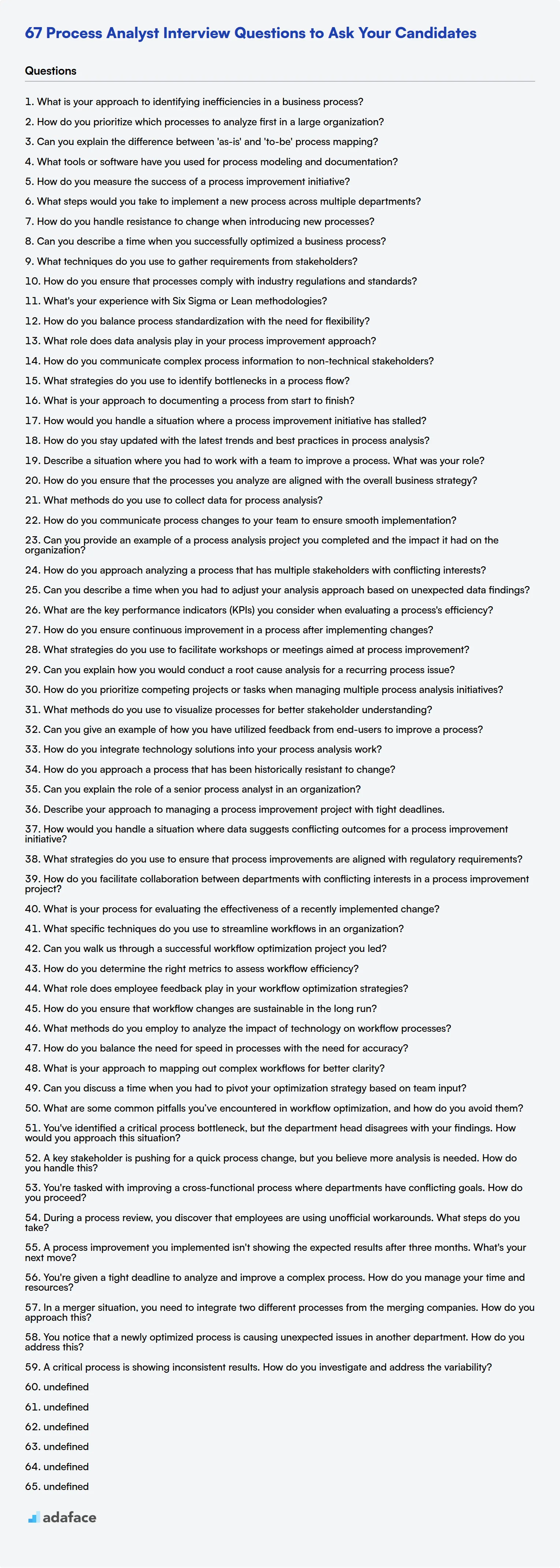Hiring a Process Analyst involves more than just scanning resumes; it's about asking the right questions to pinpoint candidates with the necessary skills and potential. A well-prepared list of interview questions can help identify candidates who can analyze and improve business processes, aligning with your company's needs. Identifying process analyst qualities is a good start.
This blog post is structured to guide you through various interview question categories, from basic to advanced, suitable for different experience levels in process analysis. Additionally, it covers questions on workflow optimization techniques and situational and behavioral aspects to ensure a comprehensive assessment approach.
By utilizing this curated list, you can enhance your interview process and effectively distinguish top talent. To further streamline your hiring, consider using our business analyst assessment test prior to conducting interviews.
Table of contents
15 basic Process Analyst interview questions and answers to assess candidates
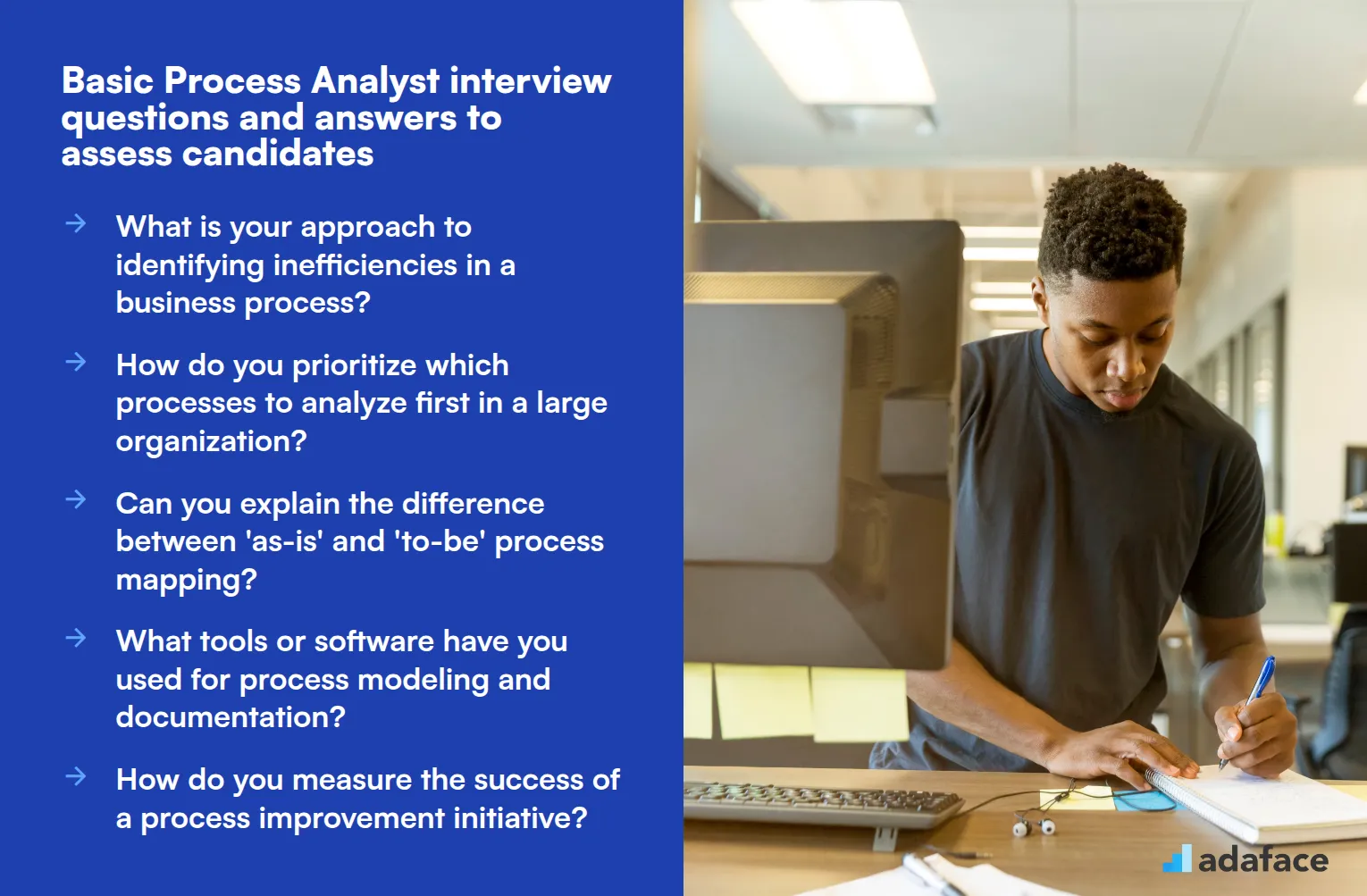
To effectively assess candidates for a Process Analyst role, use these basic interview questions to gauge their understanding of key concepts and skills required for the position. These questions will help you identify applicants who can analyze, improve, and document business processes effectively.
- What is your approach to identifying inefficiencies in a business process?
- How do you prioritize which processes to analyze first in a large organization?
- Can you explain the difference between 'as-is' and 'to-be' process mapping?
- What tools or software have you used for process modeling and documentation?
- How do you measure the success of a process improvement initiative?
- What steps would you take to implement a new process across multiple departments?
- How do you handle resistance to change when introducing new processes?
- Can you describe a time when you successfully optimized a business process?
- What techniques do you use to gather requirements from stakeholders?
- How do you ensure that processes comply with industry regulations and standards?
- What's your experience with Six Sigma or Lean methodologies?
- How do you balance process standardization with the need for flexibility?
- What role does data analysis play in your process improvement approach?
- How do you communicate complex process information to non-technical stakeholders?
- What strategies do you use to identify bottlenecks in a process flow?
8 Process Analyst interview questions and answers to evaluate junior process analysts
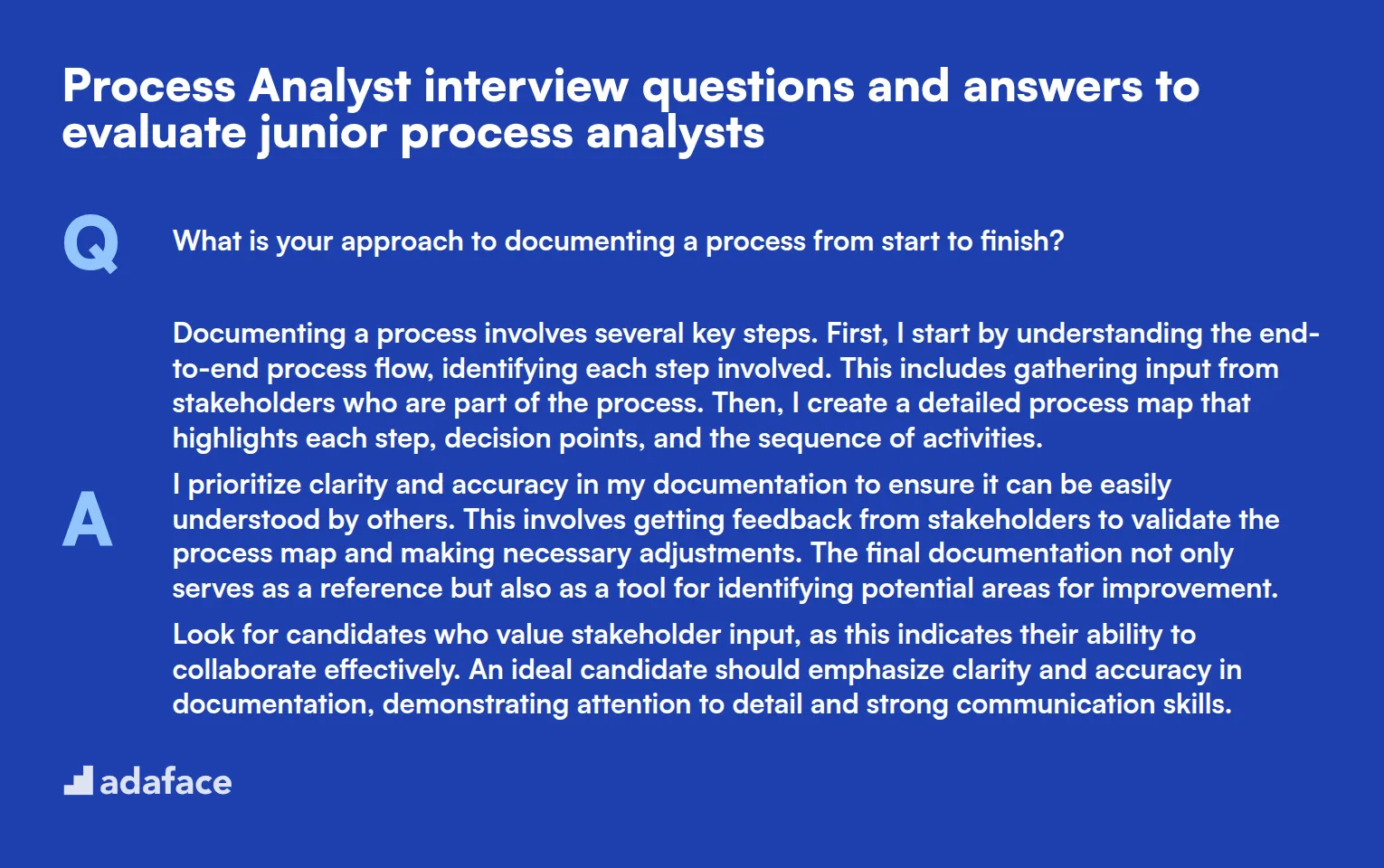
In the quest to hire skilled junior process analysts, you need the right questions to identify their potential and problem-solving prowess. This list of interview questions is designed to uncover candidates' analytical abilities and understanding of key process concepts. Use them to ensure you're selecting the right fit for your organization's process improvement journey.
1. What is your approach to documenting a process from start to finish?
Documenting a process involves several key steps. First, I start by understanding the end-to-end process flow, identifying each step involved. This includes gathering input from stakeholders who are part of the process. Then, I create a detailed process map that highlights each step, decision points, and the sequence of activities.
I prioritize clarity and accuracy in my documentation to ensure it can be easily understood by others. This involves getting feedback from stakeholders to validate the process map and making necessary adjustments. The final documentation not only serves as a reference but also as a tool for identifying potential areas for improvement.
Look for candidates who value stakeholder input, as this indicates their ability to collaborate effectively. An ideal candidate should emphasize clarity and accuracy in documentation, demonstrating attention to detail and strong communication skills.
2. How would you handle a situation where a process improvement initiative has stalled?
When a process improvement initiative stalls, the first step is to diagnose the root cause. This may involve reviewing the project timeline, identifying bottlenecks, and assessing whether there are any resource constraints or stakeholder disagreements.
Once the issue is identified, I would engage with key stakeholders to discuss potential solutions. This could involve reallocating resources, adjusting timelines, or revisiting the original objectives to ensure alignment with organizational goals.
The candidate's response should show problem-solving skills and a proactive approach to addressing challenges. Look for their ability to communicate effectively and collaborate with stakeholders to get the initiative back on track.
3. How do you stay updated with the latest trends and best practices in process analysis?
Staying updated with the latest trends in process analysis involves continuous learning and engagement with industry resources. I regularly follow leading publications, attend webinars, and participate in relevant workshops or conferences.
I also find value in networking with other professionals to exchange insights and experiences. This helps me incorporate new methodologies and tools into my work, ensuring that my approach to process analysis remains current and effective.
Candidates should demonstrate a commitment to professional development. Their answer should reflect an interest in learning and adapting, which is crucial for staying relevant in the ever-evolving field of process analysis. You can explore more on skills required for process analysts.
4. Describe a situation where you had to work with a team to improve a process. What was your role?
In one of my previous roles, I worked with a cross-functional team to improve the efficiency of our customer service process. My role was to conduct a thorough analysis of the current process, identify pain points, and propose actionable improvements.
I facilitated brainstorming sessions with the team to gather diverse perspectives and solutions. By collaborating closely with team members, we were able to streamline the process, reduce response times, and enhance customer satisfaction.
An ideal candidate should highlight their teamwork skills and ability to engage with diverse groups. Their experience in facilitating discussions and driving improvements through collaboration will be key indicators of their effectiveness in a team setting.
5. How do you ensure that the processes you analyze are aligned with the overall business strategy?
Alignment with the overall business strategy is crucial for effective process analysis. I begin by thoroughly understanding the organization's strategic objectives and ensuring that the processes I analyze support these goals.
This involves regular communication with key stakeholders and decision-makers to ensure that any proposed process improvements are aligned with business priorities. I also evaluate the impact of process changes on the organization's goals, ensuring that they contribute to strategic success.
The candidate should demonstrate an understanding of the importance of strategic alignment. Look for their ability to communicate and collaborate with stakeholders to ensure that process improvements support the broader organizational objectives.
6. What methods do you use to collect data for process analysis?
To collect data for process analysis, I employ a combination of qualitative and quantitative methods. This includes conducting interviews and surveys with process participants to gather insights and data.
I also analyze existing process documentation and performance metrics to identify patterns and trends. This comprehensive approach ensures that I have a well-rounded understanding of the process and can make informed recommendations.
Candidates should show versatility in their data collection methods, demonstrating an ability to adapt to different scenarios. Their response should highlight their analytical skills and attention to detail in gathering accurate and relevant data.
7. How do you communicate process changes to your team to ensure smooth implementation?
Effective communication is key to the successful implementation of process changes. I start by clearly explaining the rationale behind the changes, highlighting the benefits and addressing any concerns that team members may have.
I use a variety of communication tools, such as meetings, emails, and visual aids, to ensure that everyone understands their roles and responsibilities in the new process. I also encourage feedback and provide support throughout the transition to address any issues promptly.
Look for candidates who prioritize clear and concise communication. Their ability to engage team members and address concerns will be crucial for ensuring a smooth transition and successful implementation of process changes.
8. Can you provide an example of a process analysis project you completed and the impact it had on the organization?
In a previous role, I led a process analysis project aimed at improving our inventory management system. By conducting a thorough analysis of the existing process and identifying inefficiencies, I proposed several improvements.
The implementation of these changes resulted in a 20% reduction in inventory holding costs and improved order fulfillment times. The project not only increased efficiency but also contributed to customer satisfaction and cost savings.
An ideal candidate should demonstrate a clear understanding of the impact of their work. Look for their ability to quantify improvements and communicate the value of their contributions to the organization's goals.
12 intermediate Process Analyst interview questions and answers to ask mid-tier process analysts.
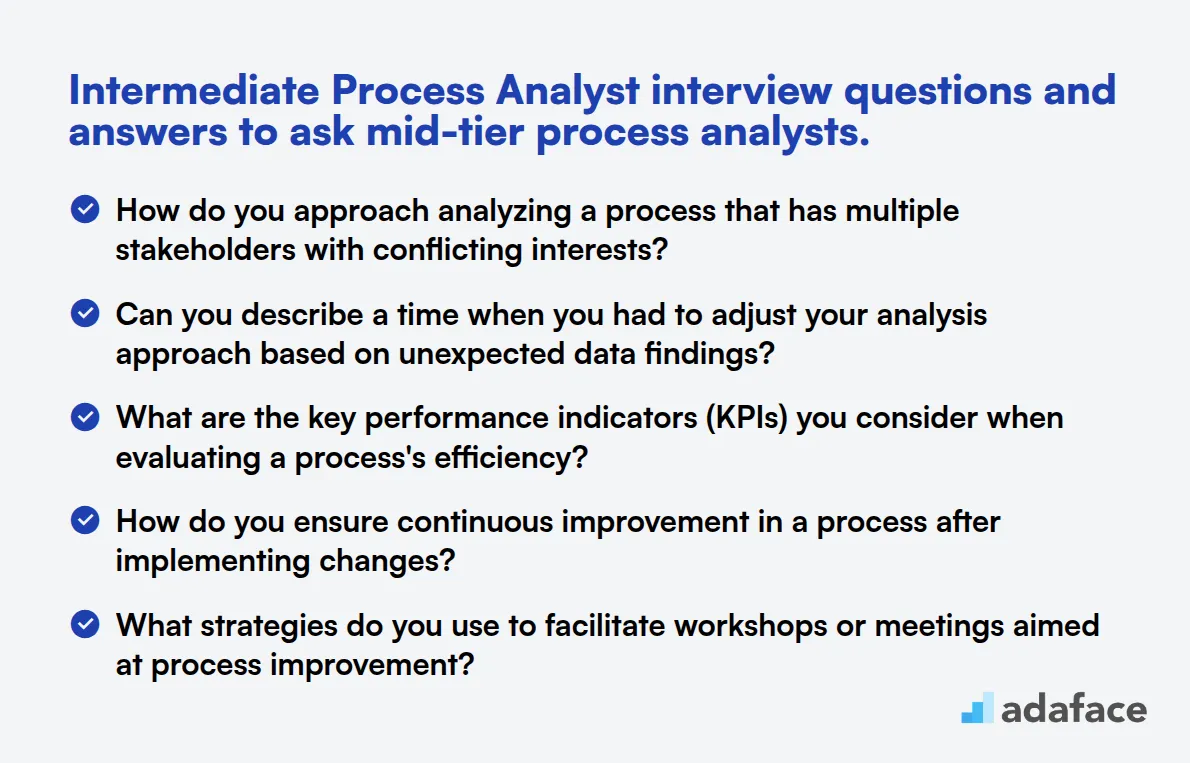
To effectively assess mid-tier process analysts, this list of interview questions is essential. These questions can help you gauge their problem-solving skills and experience in process optimization, ensuring you find the right fit for your team. For additional insights on the role, check out this detailed description.
- How do you approach analyzing a process that has multiple stakeholders with conflicting interests?
- Can you describe a time when you had to adjust your analysis approach based on unexpected data findings?
- What are the key performance indicators (KPIs) you consider when evaluating a process's efficiency?
- How do you ensure continuous improvement in a process after implementing changes?
- What strategies do you use to facilitate workshops or meetings aimed at process improvement?
- Can you explain how you would conduct a root cause analysis for a recurring process issue?
- How do you prioritize competing projects or tasks when managing multiple process analysis initiatives?
- What methods do you use to visualize processes for better stakeholder understanding?
- Can you give an example of how you have utilized feedback from end-users to improve a process?
- How do you integrate technology solutions into your process analysis work?
7 advanced Process Analyst interview questions and answers to evaluate senior process analysts
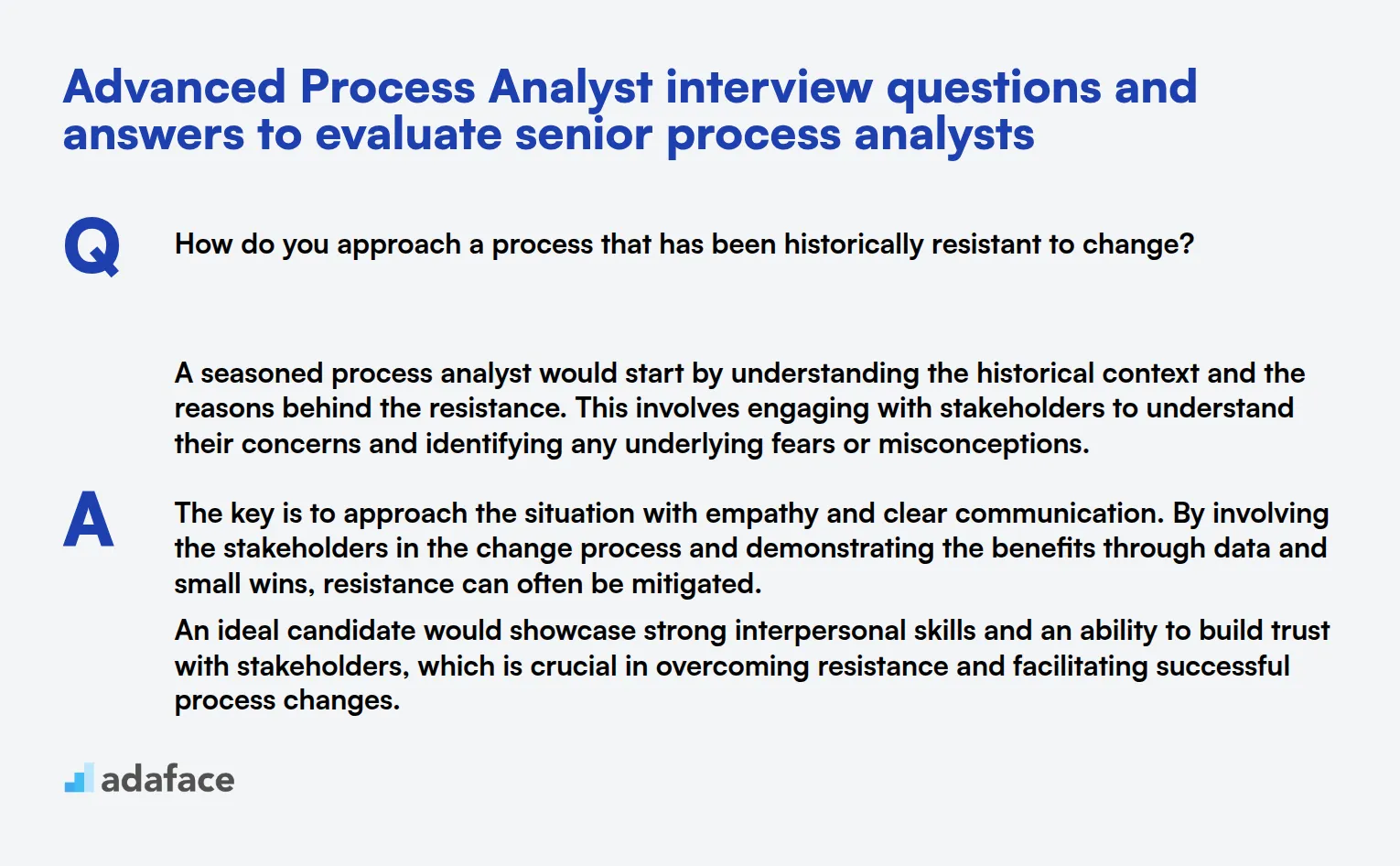
To find the best fit for your senior process analyst role, dive into these advanced interview questions. These queries are designed to reveal the depth of candidates' expertise and their ability to tackle complex process challenges. Use them to ensure your next hire is a seasoned pro ready to drive meaningful improvements.
1. How do you approach a process that has been historically resistant to change?
A seasoned process analyst would start by understanding the historical context and the reasons behind the resistance. This involves engaging with stakeholders to understand their concerns and identifying any underlying fears or misconceptions.
The key is to approach the situation with empathy and clear communication. By involving the stakeholders in the change process and demonstrating the benefits through data and small wins, resistance can often be mitigated.
An ideal candidate would showcase strong interpersonal skills and an ability to build trust with stakeholders, which is crucial in overcoming resistance and facilitating successful process changes.
2. Can you explain the role of a senior process analyst in an organization?
A senior process analyst acts as a bridge between various departments, aligning business processes with strategic goals. They are responsible for identifying inefficiencies, recommending improvements, and ensuring the successful implementation of new processes.
Their role often involves mentoring junior analysts and leading cross-functional teams. They also ensure that process improvements are sustainable and aligned with the organization's objectives.
Look for candidates who demonstrate a deep understanding of both strategic and operational aspects of process analysis, and who can clearly articulate the impact of their work on the organization's overall strategy.
3. Describe your approach to managing a process improvement project with tight deadlines.
In managing a project with tight deadlines, effective prioritization and time management are crucial. A senior process analyst would begin by breaking down the project into smaller tasks, assigning responsibilities, and setting clear timeframes for each phase.
Regular status updates and agile methodologies can help in adapting to any unforeseen challenges. It's also essential to keep communication lines open with all stakeholders to ensure alignment.
An ideal candidate would illustrate their ability to manage stress and prioritize tasks effectively while maintaining high-quality standards in their deliverables.
4. How would you handle a situation where data suggests conflicting outcomes for a process improvement initiative?
Faced with conflicting data, a senior process analyst would conduct a deeper dive into the data collection methods and sources to ensure accuracy and validity. They might also consult with colleagues or industry experts for additional perspectives.
The focus should be on identifying the root cause of the discrepancies and exploring alternative data points or methodologies to validate findings.
Candidates should demonstrate analytical thinking and problem-solving skills, emphasizing their ability to make decisions based on evidence rather than assumptions.
5. What strategies do you use to ensure that process improvements are aligned with regulatory requirements?
Ensuring compliance with regulatory requirements starts with a thorough understanding of the applicable regulations. A senior process analyst would incorporate these requirements into the process design and continuously monitor for compliance.
Regular audits and updates to the processes ensure ongoing adherence to regulations. Collaboration with legal and compliance teams is also crucial to staying updated on any changes.
Look for candidates who can effectively balance regulatory compliance with process efficiency, highlighting their attention to detail and commitment to ethical standards.
6. How do you facilitate collaboration between departments with conflicting interests in a process improvement project?
Facilitating collaboration requires a strong focus on communication and relationship-building. A senior process analyst would start by identifying common goals and demonstrating how collaboration can benefit all parties involved.
Mediating conflicts through open discussions and workshops can help in finding mutually beneficial solutions. It's important to maintain transparency and encourage input from all stakeholders.
Ideal candidates should show their ability to navigate complex interpersonal dynamics, utilizing negotiation skills to align different interests towards a common goal.
7. What is your process for evaluating the effectiveness of a recently implemented change?
The evaluation process begins with defining clear metrics and KPIs that align with the goals of the change initiative. Regular monitoring and analysis of these metrics help determine the effectiveness of the change.
Feedback from stakeholders and end-users is also an essential component of the evaluation process, providing qualitative insights into the change's impact.
Candidates should demonstrate their ability to integrate both quantitative and qualitative evaluation methods, highlighting a comprehensive approach to assessing process improvements.
10 Process Analyst interview questions about workflow optimization techniques
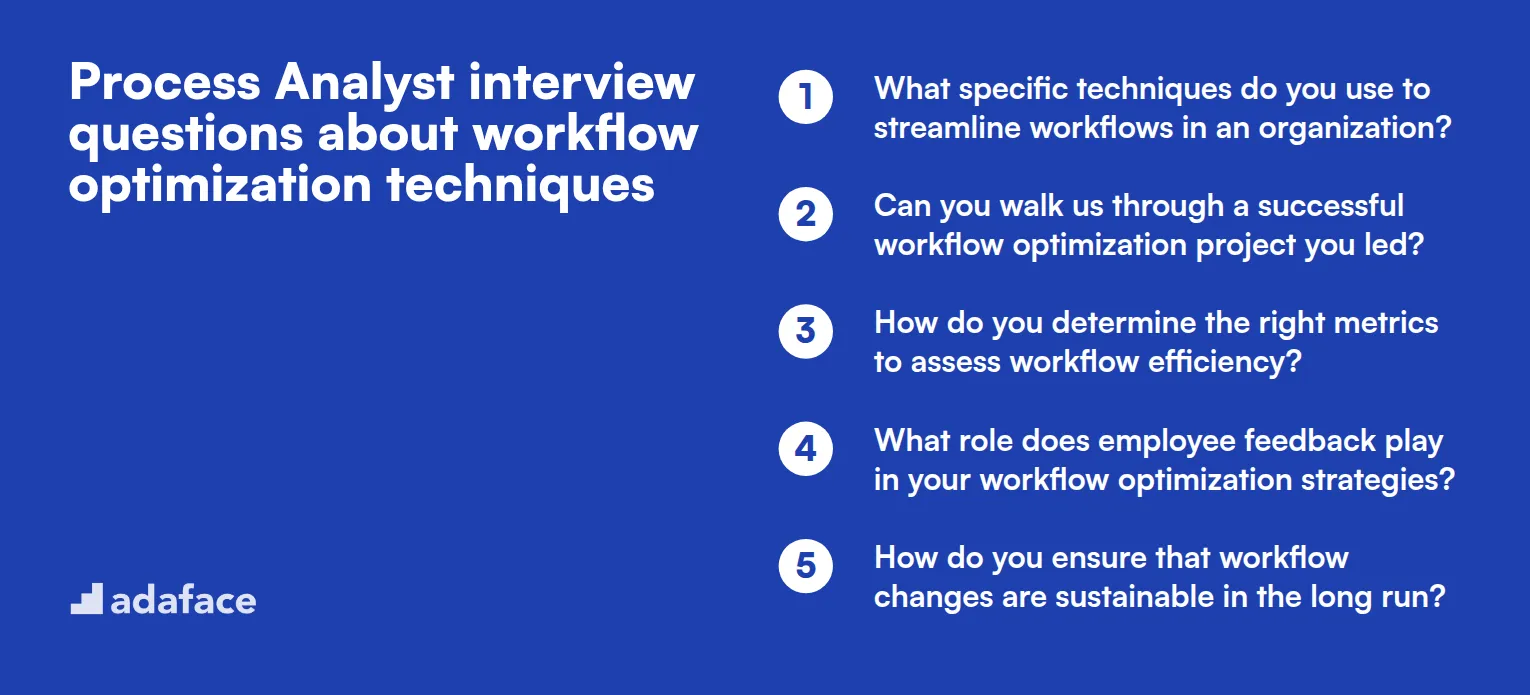
To effectively gauge a candidate's ability to enhance processes, consider using these targeted questions about workflow optimization techniques. They can help you identify whether the applicant possesses the skills necessary for a successful process analyst role.
- What specific techniques do you use to streamline workflows in an organization?
- Can you walk us through a successful workflow optimization project you led?
- How do you determine the right metrics to assess workflow efficiency?
- What role does employee feedback play in your workflow optimization strategies?
- How do you ensure that workflow changes are sustainable in the long run?
- What methods do you employ to analyze the impact of technology on workflow processes?
- How do you balance the need for speed in processes with the need for accuracy?
- What is your approach to mapping out complex workflows for better clarity?
- Can you discuss a time when you had to pivot your optimization strategy based on team input?
- What are some common pitfalls you’ve encountered in workflow optimization, and how do you avoid them?
9 situational Process Analyst interview questions for hiring top process analysts
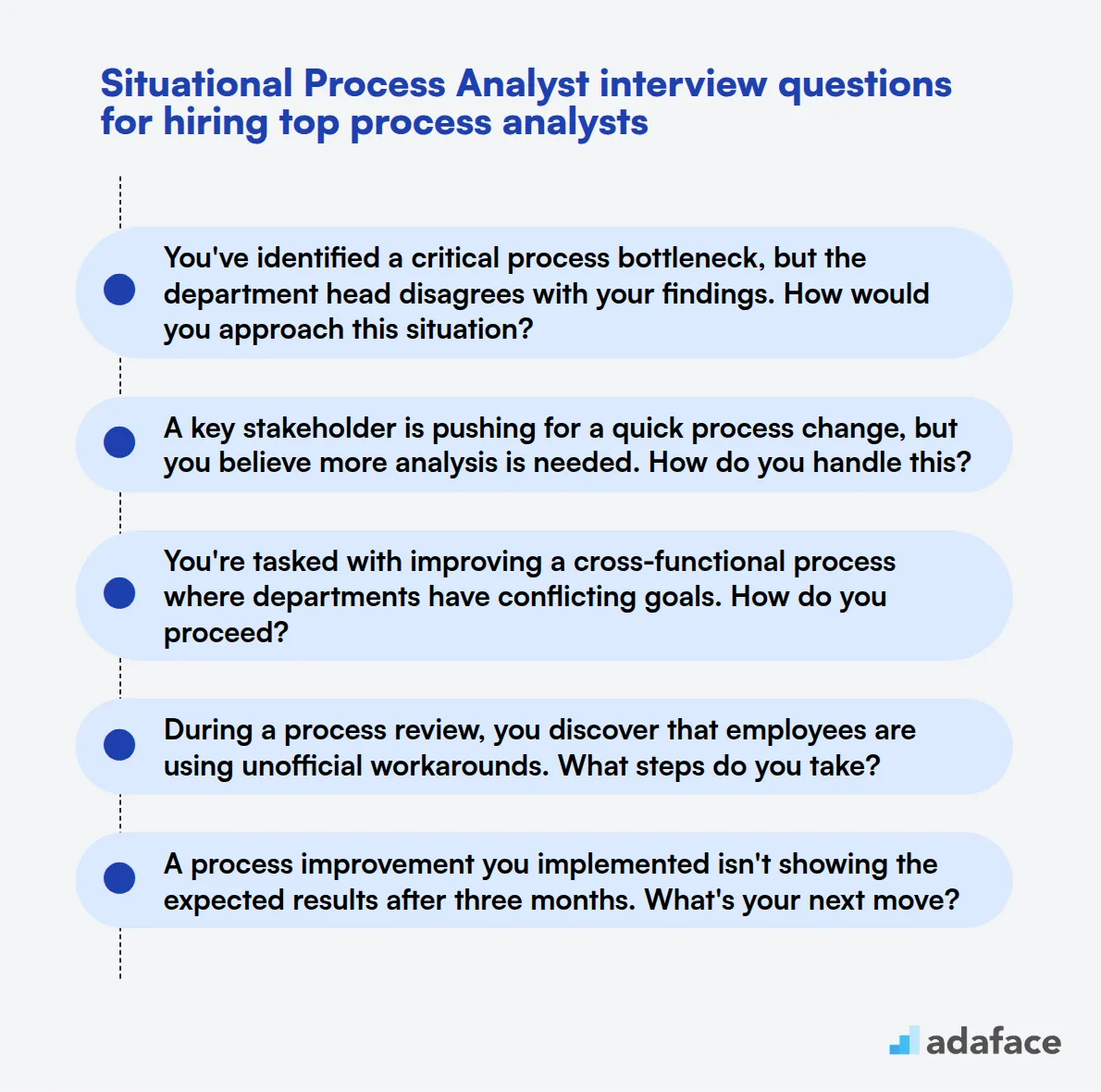
To assess a candidate's ability to handle real-world scenarios as a process analyst, use these situational interview questions. They help evaluate problem-solving skills, adaptability, and practical application of process analysis techniques in various business contexts.
- You've identified a critical process bottleneck, but the department head disagrees with your findings. How would you approach this situation?
- A key stakeholder is pushing for a quick process change, but you believe more analysis is needed. How do you handle this?
- You're tasked with improving a cross-functional process where departments have conflicting goals. How do you proceed?
- During a process review, you discover that employees are using unofficial workarounds. What steps do you take?
- A process improvement you implemented isn't showing the expected results after three months. What's your next move?
- You're given a tight deadline to analyze and improve a complex process. How do you manage your time and resources?
- In a merger situation, you need to integrate two different processes from the merging companies. How do you approach this?
- You notice that a newly optimized process is causing unexpected issues in another department. How do you address this?
- A critical process is showing inconsistent results. How do you investigate and address the variability?
6 behavioral Process Analyst interview questions and answers
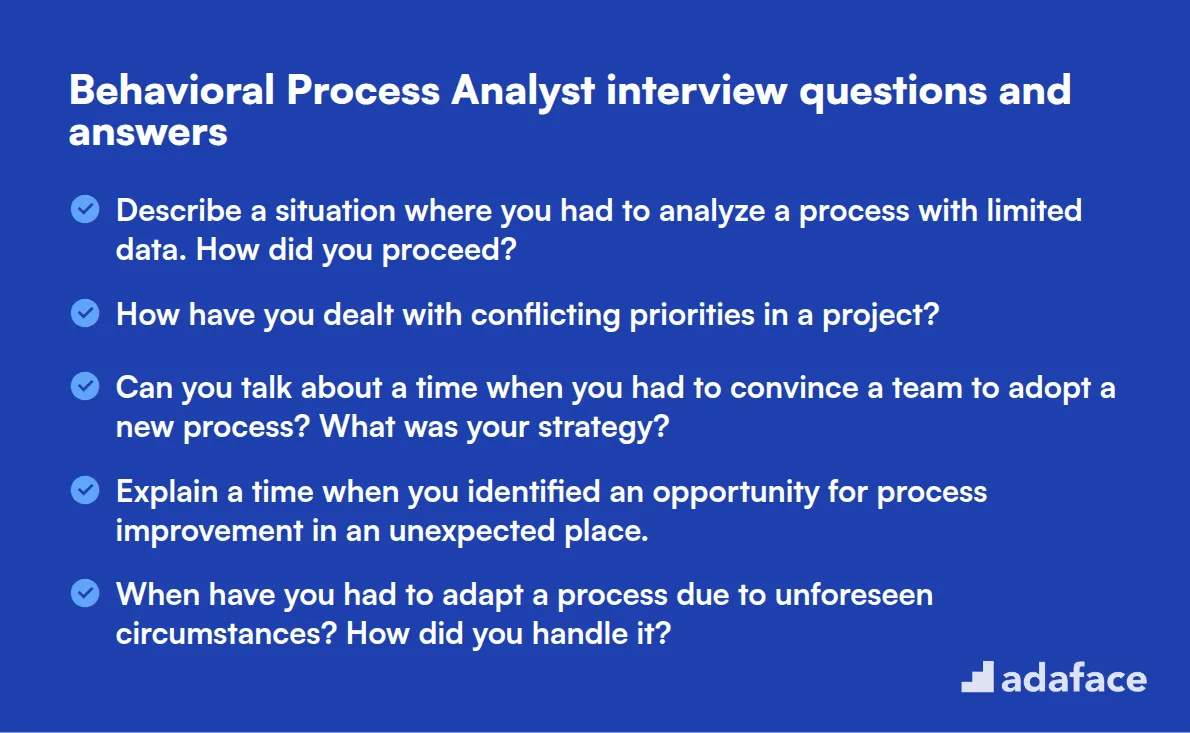
To gauge how candidates handle real-world situations, use these behavioral interview questions tailored for Process Analysts. They offer insights into how applicants think and react, helping you identify those who can effectively navigate the complexities of process analysis.
1. Describe a situation where you had to analyze a process with limited data. How did you proceed?
Strong candidates should demonstrate creativity and resourcefulness when faced with data limitations. They might mention using qualitative insights, interviewing stakeholders, or leveraging similar past projects to fill data gaps.
Look for candidates who emphasize adaptability and problem-solving skills. An ideal response will include a structured approach to tackling the problem, perhaps using skills required for process analysts, even when data is sparse.
2. How have you dealt with conflicting priorities in a project?
Candidates should discuss clear communication, prioritization, and negotiation as essential strategies. They might illustrate how they balanced stakeholder expectations while ensuring project objectives were met.
Seek answers that highlight the candidate’s ability to stay organized and maintain project momentum despite conflicting demands. A great response will show an understanding of strategic alignment and stakeholder management.
3. Can you talk about a time when you had to convince a team to adopt a new process? What was your strategy?
Convincing a team to adopt change often requires empathy and effective communication. Candidates should demonstrate how they identified team concerns and presented clear benefits of the new process.
An excellent answer will include specific examples of overcoming resistance and fostering collaboration. Look for evidence of leadership and the ability to articulate a compelling vision for change.
4. Explain a time when you identified an opportunity for process improvement in an unexpected place.
An insightful candidate will describe their experience of identifying inefficiencies in overlooked areas. They should detail how they used analytical skills to bring about meaningful improvements.
Expect answers that demonstrate keen observational skills and a proactive approach to continuous improvement. The candidate’s response should include measurable impacts of their initiative.
5. When have you had to adapt a process due to unforeseen circumstances? How did you handle it?
Adaptability is key when processes face unexpected challenges. Candidates should explain how they assessed the situation, made necessary adjustments, and communicated changes effectively.
Look for responses that show resilience and strategic thinking. Ideal candidates will highlight their ability to maintain process integrity while being flexible in their approach.
6. Describe a time when your analysis led to a significant change in the organization. What was the impact?
The candidate should offer a detailed account of a project where their analysis resulted in substantial organizational change. They might discuss the steps taken, challenges faced, and the ultimate outcomes.
Strong responses will include specific metrics or qualitative improvements, showcasing the candidate’s ability to drive impactful change. Look for evidence of initiative and the ability to generate value for the organization.
Which Process Analyst skills should you evaluate during the interview phase?
Conducting an interview for a Process Analyst role can be a daunting task, given the range of skills and competencies these professionals must possess. While a single interview won't reveal everything about a candidate's abilities, evaluating key skills helps ensure that you select the right person for the job.
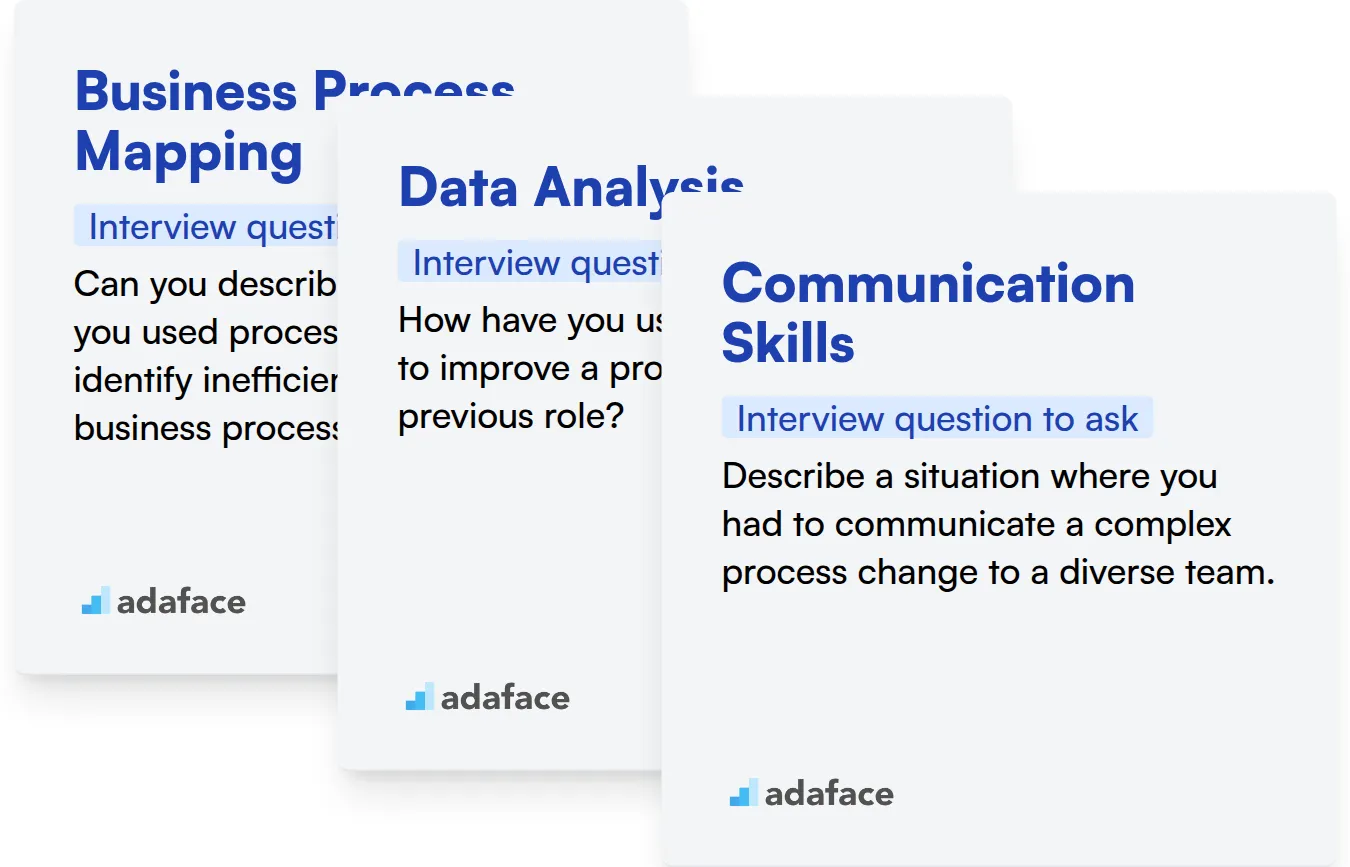
Business Process Mapping
Consider utilizing an Assessment Test that includes relevant MCQs to gauge a candidate's business process mapping capabilities.
To assess this skill further, interviewers can ask targeted questions tailored to evaluate a candidate's understanding of process mapping.
Can you describe a time when you used process mapping to identify inefficiencies in a business process?
When asking this question, look for candidates who can clearly articulate their process, the tools they used, and how their analysis led to tangible improvements.
Data Analysis
Using a Data Analysis Test with relevant MCQs can help identify candidates with strong data analysis skills.
Interview questions focused on data analysis can provide deeper insights into a candidate's ability to interpret and utilize data effectively.
How have you used data analysis to improve a process in your previous role?
Seek responses that demonstrate a candidate's ability to derive actionable insights from data, along with examples of how they applied these insights to drive process improvements.
Communication Skills
Consider using a Communication Skills Test to evaluate this critical ability.
Through specific questions, you can assess how well candidates can communicate their ideas and influence others.
Describe a situation where you had to communicate a complex process change to a diverse team.
Look for clarity in their explanation and examples of how they adapted their communication style to fit different audiences, highlighting their persuasion and negotiation skills.
3 Tips for Using Process Analyst Interview Questions
Here are our tips before you start putting what you've learned to use in your interviews. These strategies will help ensure that you maximize your assessment of potential candidates.
1. Implement Skill Tests Before Interviews
Skill tests are effective tools to evaluate a candidate’s abilities before they reach the interview stage. They help you screen for essential skills needed for a Process Analyst role early in the hiring process.
Consider using tests that align with the core skills of a Process Analyst such as the Business Analyst Assessment Test or the Critical Thinking Test. These tests can help in identifying candidates who have a strong foundation in analytical and problem-solving skills.
By incorporating these tests, you can streamline your interview process and focus on candidates who demonstrate the necessary skills. Transitioning to the interview stage, it's time to compile the right questions that will further probe their abilities.
2. Compile a Set of Interview Questions
Time is limited during interviews, so selecting the right questions is key to maximizing the evaluation. Focus on questions that assess important aspects and skills relevant to the Process Analyst role.
In addition to role-specific questions, consider including related questions from other skill areas such as critical thinking or communication. Resources like the Communication Assessment Tools can offer valuable insights.
3. Use Follow-Up Questions Effectively
Relying solely on scripted questions may not be enough to gauge a candidate’s depth. Follow-up questions can reveal a candidate's true understanding and how they might apply their skills in real scenarios.
For instance, if asking about a candidate’s experience with workflow optimization, a follow-up like 'Can you describe a specific challenge you faced during optimization and how you resolved it?' can offer insights into their problem-solving approach and adaptability.
Use Process Analyst interview questions and skills tests to hire talented analysts
If you are looking to hire someone with strong process analysis skills, it's important to ensure they possess the required competencies. The most effective way to perform this evaluation is by utilizing specialized skills tests. Consider using our Business Analyst Assessment Test or the Data Analysis Test to accurately measure these capabilities.
Once you have used these tests, you can shortlist the best candidates and invite them for interviews. To proceed, you can easily sign up on our platform to access these tests by visiting our online assessment platform page. Start your recruitment process with us to find the perfect fit for your team.
Business Analyst Aptitude Online Test
Download Process Analyst interview questions template in multiple formats
Process Analyst Interview Questions FAQs
A Process Analyst should have analytical thinking, problem-solving, communication skills, and a strong understanding of process management and optimization techniques.
Focus on basic understanding of processes, eagerness to learn, problem-solving abilities, and communication skills during interviews.
Ask candidates how they would handle specific scenarios, such as improving a failing process or dealing with team conflicts.
Behavioral questions help assess a candidate's past experiences and predict how they will handle similar situations in the future.
Workflow optimization involves streamlining processes to increase efficiency, often using tools like process mapping and Lean methodologies.

40 min skill tests.
No trick questions.
Accurate shortlisting.
We make it easy for you to find the best candidates in your pipeline with a 40 min skills test.
Try for freeRelated posts
Free resources




